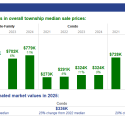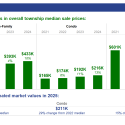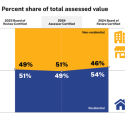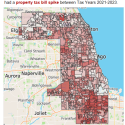Assessor’s Office Announces Launch of New Affordable Housing Property Tax Relief Program
Monday, February 7, 2022
Watch the full press conference
Cook County- Assessor Fritz Kaegi was joined by state legislators and affordable housing advocates today to launch the Affordable Housing Special Assessment Program, a new form of property tax relief that was recently signed into law.
Assessor Kaegi worked with legislative partners who passed the law in the spring of 2021, including State Sens. Sara Feigenholtz, Ann Gillespie, and Mattie Hunter and State Reps. Will Guzzardi and Delia Ramirez. Community housing advocates Allison Clements, executive director of the Illinois Housing Council, and Stacie Young, President and CEO of Community Investment Corporation, along with other affordable housing supporters, advocated for the change to the law and worked to craft the language for it.
In a press conference, Assessor Kaegi, legislators, and advocates discussed how affordable housing property owners could apply for this new type of property tax relief and how they, as well as tenants, will benefit from it.
“Without this coalition of leaders and organizers, we would not have been able to take this important step toward encouraging more affordable housing in Cook County,” said Assessor Kaegi. “The implementation of this law by my office will clear the way for property tax relief for developers who create and maintain this valuable housing category, and will expand the availability of rental units for low-income households.”
The Assessor’s Office is asking potential applicants to apply by March 31, 2022. Interested parties can visit cookcountyassessor.com/affordable-housing to access the application and read more information.
A series of webinars about the Affordable Housing Special Assessment Program will take place in February and March for those who provide and utilize affordable housing. The first webinar will focus on properties that have previously taken advantage of Cook County’s Class 9 incentive program. The date for this first webinar will be Tuesday, February 15, 2022. Attendees can sign up by emailing assessor.affordablehousing@cookcountyil.gov. Future webinars will focus on institutional-grade properties, naturally occurring affordable housing, and low-affordability communities.
"One of Illinois’ biggest challenges has always been affordable housing, which was amplified during the pandemic,” said Sen. Feigenholtz. “Providing incentives to local mom-and-pop landlords and new developments to keep rent affordable for future and existing tenants was the goal of this legislation.”
"Creating options for working families in every neighborhood will diversify and grow our communities in a way that works for everyone, not just those with wealth," Sen. Gillespie said. "I encourage local developers to apply for this program so we can build an equitable future of housing for all Illinoisans in every corner of the state."
“Affordable housing is an essential right that needed to be addressed long before the pandemic, and I am glad that much-needed change is coming to fruition,” said Sen. Hunter, Majority Caucus Chair. “This measure will help families stay in their homes. I am proud of the work we've done and I hope that affordable and equitable options prevail long after the COVID-19 pandemic is gone."
“This new program is a critical policy tool that will incentivize investment in affordable rental housing across all types of communities,” said Allison Clements, executive director of the Illinois Housing Council. We appreciate the collaboration of the Cook County Assessor’s Office to ensure a successful implementation of the program.”
Created by state statute, this exciting new program provides property tax relief to incentivize the creation, rehabilitation, and maintenance of affordable housing units in Cook County for eligible applicants, beginning with the 2022 assessment year.
"We need to use every tool at our disposal to encourage the creation and preservation of affordable housing in our communities,” said Rep. Will Guzzardi. “Assessor Kaegi's implementation of our legislation in Springfield will incentivize developers and housing providers to keep units affordable at a time when renters desperately need it. I'm grateful to Fritz and his team for their leadership on equity and affordability."
"We had a historic session last year advancing housing issues in the General Assembly,” said Rep. Ramirez, House Assistant Majority Leader. “This new property tax relief program for those who develop and maintain affordable housing was a key component of our comprehensive affordable housing legislation. This program will help Illinois continue to lead on making housing accessible and affordable for all.
While similar to existing housing incentives, this new program provides improved benefits for housing providers as well as low-income households by providing more expansive property tax benefits, more ways to qualify, and by encouraging the development of affordable housing in low affordability communities.
"Thanks to many partners working together, this is one of the rare housing policies that works across different markets and building types - including the unsubsidized, naturally occurring affordable housing which comprises the vast majority of the affordable rental stock here and across the country," said Stacie Young, President, and CEO of Community Investment Corporation.
The applications for the program are available now. To apply, and for more information on the Affordable Housing Special Assessment Program, visit cookcountyassessor.com/affordable-housing.
BACKGROUND
The lack of affordable housing remains a crisis nationwide. According to a Pew Research Center 2021 survey “about half of Americans (49%) say the availability of affordable housing in their local community is a major problem, up 10 percentage points from early 2018.” For decades, Cook County administered an affordable housing incentive known as the Class 9 program, which encourages new construction and/or rehabilitation of affordable housing. However, participation in the program has not seen consistent growth over recent years, and the supply of affordable units continues to be outpaced by demand.
With the policy revisions within the Affordable Housing Special Assessment Program, Cook County Assessor Fritz Kaegi, state legislators, and affordable housing advocates have taken proactive steps to lobby for and aggressively implement new legislation that provides greater incentives to encourage a greater supply of affordable housing units.
Q: How do properties prove eligibility for the new program?
A: Owners must show that they have made substantial improvements to the rental units, that they are maintaining the property, and that affordable units are rented to households with qualifying household income paying no more than 30% of their income for housing, among other criteria.
Q: What are the dates/deadlines?
A: To be assured of receiving the special assessment on the 2023 tax bill for the 2022 assessment year, eligible applicants must submit parts 1 and 2 of the application no later than March 31, 2022, so that we can apply the reduction on eligible properties during our regular township calendar. Applications received after March 31 will be processed as speedily as possible. Thereafter, applications must be received January 31st to ensure that the property will receive the benefit.
Q. What are the tiers of affordability and how does that affect the reduction of assessed value that can result in reduced property taxes?
A. There are three tiers of affordability: 15, 20, and 35 percent. For properties offering 15% affordable units, the assessed value reduction is 25%. For 35%, it’s 35% of assessed value. For the 20% tier, the reduction is 100% of the difference between the value of the property one year before the affordable units are occupied and post-construction assessed value (the “base year”[1]).
Q: I have further questions about the particular aspects of a building or this program.
A: The Assessor’s Office will be hosting a series of webinars to help guide interested housing providers through the application process. The first webinar will be aimed at current and recent Class 9 properties and will be held on Tuesday, February 15. Subsequent webinars will focus on properties in Low Affordability Communities and other types of properties.
Q: What happens if a property owner sells the property?
A: The program runs with the property, it’s not based on ownership. New owners will still be required to provide affordable housing in order to receive the assessment reduction.
Q: Do units paid for with Housing Choice vouchers (formerly called Section 8 vouchers) count as “affordable” units?
A: Yes, the test is based on rent paid by a tenant with eligible income. Whether the owner receives supplemental payments or not is irrelevant.
Q: What are the filing fees?
A: Same as Class 9. The application is in two parts and the fee is $500 for Part 1 and $100 for Part 2.
Q: Does the reduction apply to the value of the land?
A: No, just the AV of the building.





